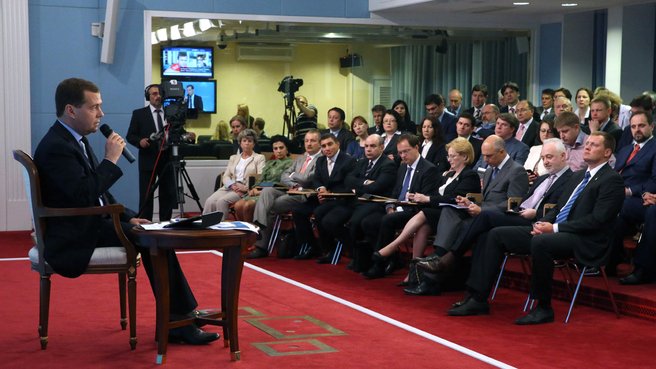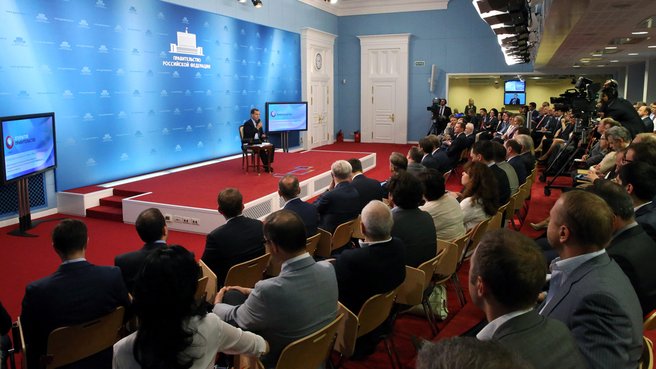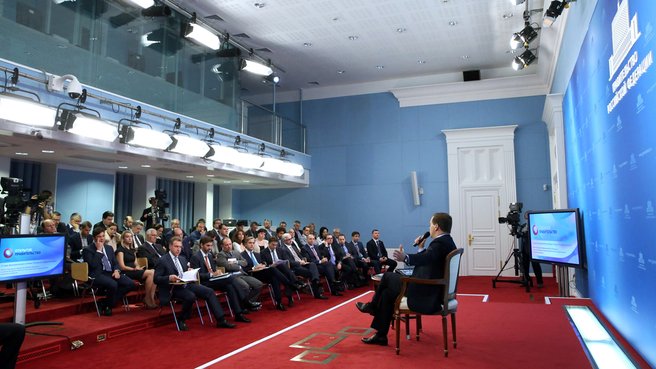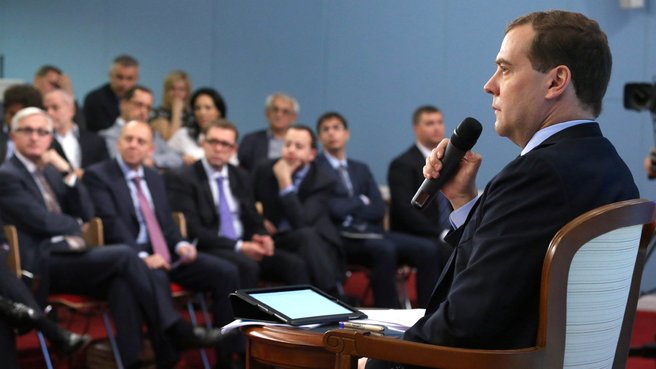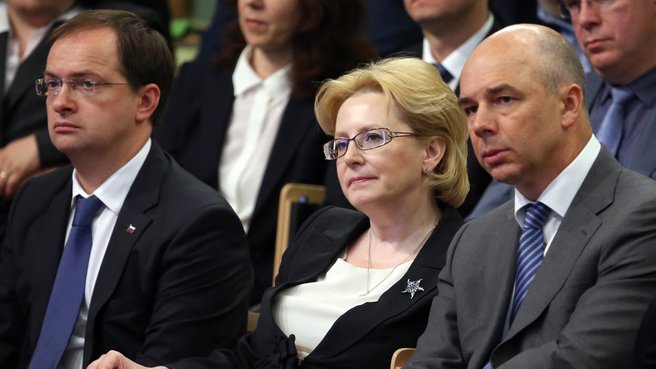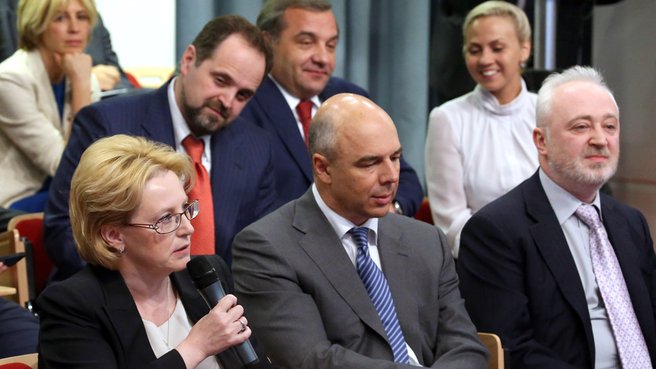The results of the first year of the Open Government's operation, and goals for the near future, were discussed at the meeting.
Transcript:
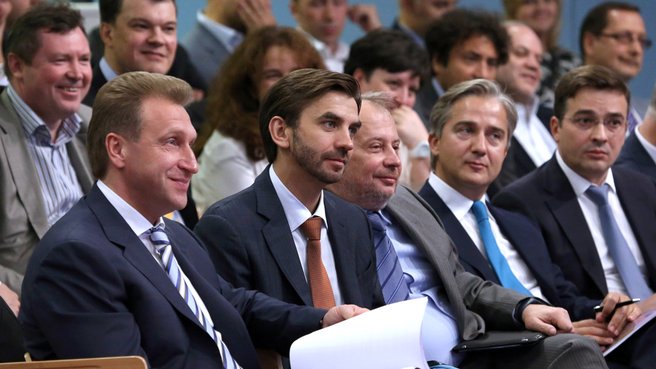
First Deputy Prime Minister Igor Shuvalov addresses the meeting with members of the Government Expert Council and representatives of the expert community
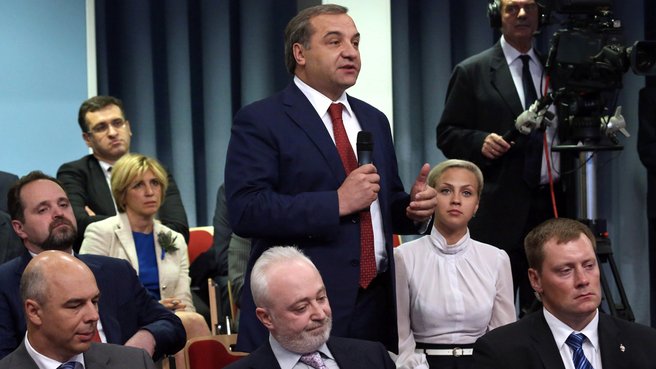
Minister for Civil Defence, Emergencies and Disaster Relief Vladimir Puchkov addresses the meeting with members of the Government Expert Council and representatives of the expert community
Meeting with members of the Government Expert Council and other experts
Dmitry Medvedev: Good afternoon. I’ve called all of you here to thank you for the work you did last year in the Government Expert Council and the Open Government. Let’s briefly sum up the results – what we have done, where we did a good job and where we failed.
At any rate, the very idea (I think I'm expressing our common opinion) of the Open Government has justified itself.
Dmitry Medvedev: “We discuss virtually all important issues openly at Government meetings. The main issues are announced and discussed in the open. They are filmed by cameras <…> All our people – should know what the Government is doing and what decisions it is making.”
Its procedures have become part of the work of our fundamental Government. The question is, how effective have these procedures been and what have they given us? We have put many documents through the Open Government procedures. Some debates were quite heated, open and productive. The Open Government took part in the discussion of thirty draft laws – on education, environmental protection and social services, to name a few. We have also reviewed dozens of state programmes and concepts with it. In any event the final documents reflect the results of its work. Time will show whether our joint work has improved these documents. Discussions always contain a rational kernel. To say the least, they help bring bureaucratic papers to life, create modern forms of work and remove major problems. This is what the Open Government was involved in.
For me the informal discussion of the law on industrial safety was probably the most indicative example. As a result, the draft law has become much better (this is recognised by everyone, and most importantly, by business, which is always critical of government procedures). The draft was subjected to numerous amendments and a new mechanism was formed. I hope someone will tell us about this.
I’d also like to mention the discussions we had on the mega regulator of the financial market and the recent debates on the tax policy guidelines. Starting from this year, specifically from February or March, experts have been taking part in the discussion of laws and other documents at meetings of our closed Government – or not completely closed, considering your presence at these meetings. By the way, we discuss virtually all important issues openly at Government meetings. The main issues are announced and discussed in the open. They are filmed by cameras, which is sometimes inconvenient. Colleagues from the Government come to me and say: “Maybe we should close this a bit?” Usually I don’t agree with them because I believe that our people – not just experts, but all our people – should know what the Government is doing and what decisions it is making. I think it is useful to hear points of view or listen to debates.
Dmitry Medvedev: “The idea of having open discussions is being carried out not only in our Federal Government but also in individual ministries and departments. This project is called the Open Ministry. Five federal ministers have already declared the priorities of their domains, and I think this is a good undertaking.”
We will continue involving experts in discussions at Government meetings and even earlier when tasks are being set. I expect you to make proposals on developing the Open Government. But I suggest we not discuss this for a long time today. It would be unfortunate if the Open Government were to meet in a year to discuss its own work and its improvement. This sounds bureaucratic to me. If there are proposals on what we should do I’m ready to listen. Mikhail Abyzov is in charge of this and some other colleagues. That said, if there is something really important, I am ready to listen.
The idea of having open discussions is being carried out not only in our Federal Government but also in individual ministries and departments. This project is called the Open Ministry. Five federal ministers have already declared the priorities of their domains, and I think this is a good undertaking. Maybe, they will also say a few words about this. At any rate, a public announcement of the plans and their discussion with all interested parties allows ministries, departments and federal executive bodies to make their work more open, more understandable for our people. Yet, I’d like to repeat that we still have a lot to do in this respect, because many people think that all we are doing is creating some administrative mess. They find it difficult to understand what is going on despite the Internet and the broadcasting of different events on television.
There is one more useful innovation: open data. I met with some experts that are here at this meeting. Federal agencies are gradually revealing this information in a machine-readable format. This makes it possible to use information for mobile applications, relevant services and for the development of the IT industry in general. The open data portal that will be launched in the near future will become a new catalyst in this respect. The Open Data Council has a special role to play in this area. I hope it will carry out all the instructions I’ve given and that the portal will be effective.
Today we can discuss the formation of standards of openness for the federal executive bodies. Ratings are compiled based on this.
Dmitry Medvedev: “I recently signed a resolution on holding a public technological and price audit of large investment projects with state participation.”
The mechanisms of the Open Government are used in different spheres, as I’ve already mentioned. I think oversight of state purchases and investment is very important. We have analysed last year’s state purchases. Government procurements for 2012 have been analysed, and a trial version of the Online Budget portal has been launched. The Federal Contract System will be launched soon in line with the adopted law. I recently signed a resolution on holding a public technological and price audit of large investment projects with state participation. I hope all these tools will be effective enough. I don’t think the year was wasted, because regardless of whether the system is good or not so good, it works and has become a fact of public life. It is being criticised. They claim it has not changed anything. Some say it has become easier to make our opinion heard and taken into account. Anyway, the system works and our objective is to improve it and make it more modern. I suppose my colleagues will say a few words about this. Let us discuss what worked and what didn't. I was given a list with the order in which speakers will speak, as usual, but I don’t think we should stick to this order in the Open Government format. Let's just raise hands if you want to voice your opinion.
<…>
